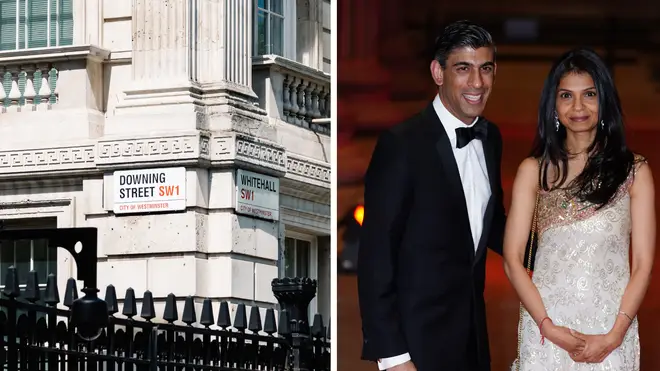
Nick Ferrari 7am - 10am
9 April 2022, 23:24 | Updated: 10 April 2022, 11:44

An inquiry into how Rishi Sunak's wife's tax affairs were leaked has been a launched as the Chancellor left his Downing Street flat.
Akshata Murty’s non-domicile status triggered a controversy with critics considering her arrangement inappropriate, especially with her husband being in charge of public finances.
In the wake of outrage aimed at her, she agreed to pay UK taxes on her overseas income - but now a Whitehall probe into how her situation was made public through the media is under way.
The Sunday Times said Mr Sunak's team believes a Labour supporter who works in Government is behind it - dubbing him "red throat", a Watergate whistleblower-style moniker.
Removals vans were spotted at Number 11 on Saturday as the family packed up their belongings and headed for their newly-refurbished, luxury pad in Kensington.
The Chancellor is expected to split his evenings between the Downing Street flat and their family home, but continue to work from Number 11, according to The Mirror.
The change of residence is an unusual precedent for the Chancellor to make and has raised questions over Mr Sunak's long term future in the ministerial position.
Close aides have claimed Mr Sunak was prepared to resign this week amid the criticism and investigation of his wife's monetary affairs.
Sources say the Chancellor will walk away from politics all together to "protect his family's privacy" with an inquiry launched into who leaked his wife's tax details.
Read more: Sunak's millionaire non-dom wife in tax U-turn as Chancellor faces fierce backlash

Rishi Sunak should resign, says Lib Dem Leader Ed Davey
The move comes after the family faced public backlash as it was revealed Mr Sunak held on to his Green Card as a 'resident' of the United Sates for more than a year after becoming Chancellor and the UK discovered Akshata Murthy enjoyed non-dom tax status.
In a dramatic U-turn, less than 48 hours after her non-domicile status was revealed, Ms Murty volunteered to pay UK income tax on her worldwide income, despite not being required by law to do so.
She said she was aware that her tax arrangements did not seem compatible with "the British sense of fairness" in a statement released on Friday evening.
She will retain her Indian citizenship and her non-domicile status. Ms Murty said it has become clear that "many do not feel it is compatible" with her husband's role as Chancellor of the Exchequer.
Read more: Chancellor Rishi Sunak admits he held US green card until last year as tax row deepens

A 'question of tax avoidance' for Rishi Sunak's wife Akshata Murthy
The row over Rishi Sunak and his family's tax situation has shown how the Chancellor and his wife are in a "completely different universe in financial terms" from ordinary people left struggling by the cost-of-living crisis, Nicola Sturgeon said.
The Scottish First Minister said revelations about his wife's finances had left Mr Sunak in a "very, very difficult" position.
Labour and the Liberal Democrats are now pressing for the millionairess to pay the back taxes she had saved through not having to pay UK taxes on her overseas income.
It has been estimated that Ms Murty, a fashion designer and the daughter of an Indian billionaire, potentially saved up to £20 million in UK tax through her non-domiciled status.
She is reported to hold a 0.91% stake in Infosys, an IT business founded by her father, and has received £11.6 million in dividends from the Indian firm in the past year.
Read more: Rishi Sunak's wife a 'legitimate' target over non-dom tax status, says Jess Phillips

Greg Hands defends Akshata Murthy
Non-dom status means she would not have to pay UK tax at a rate of 39.35% on dividends.
India sets the rate for non-residents at 20%, but this can fall to 10% for those who are eligible to benefit from the UK's tax treaty with India.
Labour has also questioned whether she would use her Indian citizenship and a treaty with the UK dating back to the 1950s to avoid paying inheritance tax - a move which could reportedly save tens of millions of pounds.